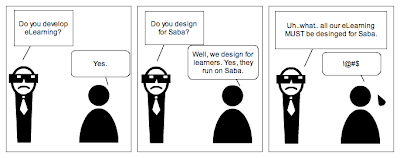I’m an adult, literate, and a professional. I manage my finances, my investments, wealth and health with equal ease. I manage my family, team, career, and social needs effortlessly. I see no reason why I cannot manage my learning and training sessions. But my training managers tend to think otherwise.
Here’s what my training managers think of my ability to learn:
I cannot spot Next and Back buttons. I need to be told, “Click Next to proceed.”
Do you know, I navigate using maps both offline and online - in fact I refer to them almost everyday on my mobile phone, laptop, and especially love my treasured paper maps. I operate DVD players, music system, home theatre, and the multiple remote control sets in my house with ease. What makes you think I cannot navigate back and forth through an eLearning course?
I cannot read text on screen - I need the same to be read out!
I have been reading since I was 5! Most of my official communication happens over email with people across geographies - and so far I have not had the need for an email reader. Although, it’s not a bad idea considering I receive around 360 emails a day! I perform all my online activities with ease, whether it is fixing an appointment with my doc, booking a movie ticket, or transacting online with my bank - so far I have never had the need for audio assistance to reiterate on-screen instructions.
I cannot decide what is important and is unimportant - so block out headers, highlight too many things on the screen, force me to go through all the tabs and clicks...
Do you really believe that if you force me to 'look' at all the tabs, you ensure that I 'learn' all the crap that’s out there! If I can navigate through heaps and piles of information around me and filter out what I need the most, what makes you think that I cannot discern between critical and non-critical info in my learning material.
For that matter, why offer me something that is not critical – it’s good to stick to things that are relevant to me? But yes, I realize where you are coming from - You want to cut down your effort and design for all! In the process, everyone like me is pained to receive things that are not meant for them!
My attention span is too short!
Well, who told you this is a problem? I drive to work everyday and have a record of zero tickets despite listening to music on the way and with 5 other vehicles around me at any point of time.
All my official communication happens over phone and email - and neither my wife, my boss, or for that matter my kids have ever complained to me about my lack of attention. What makes you conclude that I have a short attention span?
Further what makes you think that you can counter that by making me click unnecessarily on an image 5 times (to make it interactive?) Didn't it strike you that if you really wanted to hold my attention, you could make the content more engaging? Next time, try engaging my mind rather than my fingers - you may get a better feel of my attention span!
Ah, how can I forget the tests and CYUs...
While I really appreciate your efforts to help me reinforce my learning, but may I request you to put in more effort in creating these tests? Smart tests are those that tease my intelligence and not question it? Most trying are those tests where your options attempt to confuse me rather than challenge me.
Fool me with layered content.
"The course has only 15 screens; it should not take you more than 20 minutes." Well almost - until you get inside and realize there are 30 more hidden screens within these 15! Sometimes I wonder whether you really want to 'motivate' me to learn or are you trying to 'con' me by pushing across a legal document with hidden and layered clauses, sub-clauses!
I could go on and on - but I trust your intelligence and have hopefully got my message across to you.
(Inspired by some recent experience sharing sessions with Archana.)










